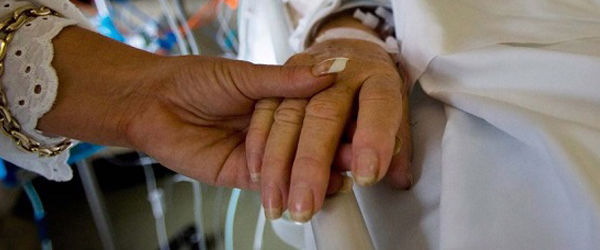Providing opportunities for ecumenical healing and interreligious dialogue were among topics discussed at the regional meeting of the Catholic Association of Diocesan Ecumenical and Interreligious Officers in El Segundo Oct. 18-19.Held at St. Andrew Russian-Greek Catholic Church, the event drawing a group of 25 priests, deacons and lay people from throughout California was hosted by Father Alexei Smith, archdiocesan director of ecumenical/interreligious affairs, and featured talks by the executive director of the U.S. Conference of Catholic Bishops Secretariat for Ecumenical and Interreligious Affairs, Father John Crossin, OSFS, and Father Don Rooney, president of CADEIO.“Christian unity is about serving others,” said Father Crossin. “We are working for Christian unity because Christ has called us to this work. We will become more holy like Christ, together -- not apart. The spiritual maturity and wisdom that we seek will not come in isolation. It will come as we share the gifts given to us by God -- with others, across boundaries.” The topic of friendship was a common thread to all of the discussions. “You can have a good spiritual friend who is from another denomination or faith,” commented Father Crossin. “The first cause of friendship is God,” he noted. “People don’t come into our lives accidentally; there is a divine providence that leads us together. Spiritual friends are few -- these are the people with whom we can share our spiritual journey. Spiritual friends encourage us to be our best selves by speaking the truth. Sometimes others can see us better than we see ourselves.” Father Crossin continued: “When it comes to our dialogue with people of other religions, for example the Muslims, we know that we are not going to be unified in matters of faith, but the skill sets that we use for listening and understanding each other are the same. That is why ‘interreligious dialogue’ and ‘Christian ecumenism’ are often grouped together, but they are for different purposes.”Meeting participant, Deacon John Cunneen, from St. Linus Church in Norwalk added, “This dialogue is about sharing gifts, not winning battles.” On Christian unity, all agreed that it is a work and gift of the Holy Spirit.“A lot of people fear the concept of ecumenism. We need to address their fear, and we need to explain what it is and what it is not,” stated Father Crossin. “Ecumenical dialogue is not effective unless one is true to his or her doctrinal beliefs. It is not about finding the lowest common denominator.” Father Crossin explained that the virtue of humility is required for discerning divine truth. “In Christian dialogue we often organize topics into these categories: ‘faith and order’ and ‘life and work,’” he said. According to Father Crossin, the “faith and order” category has to do with matters of faith and the systematic understanding of topics of faith. “Order” refers to how the church is organized. In this category, he explained, would be theological discussions on topics such as “Who God Is; How the Church is ordered” (by bishops for example); and, “What are we required to do by the Revelation of God?” “In the category ‘life and work,’” he continued, “is the ‘hands-on’ such as ‘How do we live our lives as Christians in practical ways?’ This would, of course, include prayer and service to the poor, ministry to the needy, and other works of mercy like pro-life causes.“Actually, pro-life issues fall into both categories because they are part of moral theology,” said Father Crossin. “Historically, there has been tension about the overlapping of the categories. But in recent decades, there has been more understanding that the two go together -- you have to understand why you are doing what you are doing, but you also have to do it, and you have to live out the Gospel. That gets you reflecting on the teachings of Jesus and who we should be as a community of Christians.” “In the ‘life and work’ expressions of ecumenics,” added Father Rooney, “if we could just kind of gather our resources, think of how much further we could go, and what we could share in the meantime.”Both speakers praised the contributions of German Cardinal Walter Kasper, president emeritus of the Pontifical Council for Promoting Christian Unity, who said, “I am convinced that praying together is a very important component of ecumenical dialogue. I often say, ecumenical dialogue happens in two places: in the chapel praying and at the table talking and eating.” Noting that the 500th year anniversary of the Protestant Reformation is coming up in 2017, Father Rooney commented, “It is important to provide opportunities for healing. Healing prepares the way for deeper conversation and more profound relationships. Acknowledgment of the past can free us to move into the future together.”The presenters brought up important points from the new video series, “On the Path towards Christian Unity,” produced by the USCCB and available on its website. In the video series, Father Rooney asks, “Does the unity we know as Christian sisters and brothers come as a result of our charity? Or, does our charity come as a result of our shared mission? This question could be debated in our local communities until Jesus comes again, but it won’t make any difference unless we actually start doing something now, and doing it together in the name of Jesus.”To learn more about local ecumenism and interreligious dialogue events, contact Father Alexei Smith, archdiocesan director of ecumenical/interreligious affairs at (310) 322-1892. Documents that further define the Catholic understanding of this work include Vatican II’s “Decree on Ecumenism,” the “Directory for the Application of Principles and Norms on Ecumenism,” and Pope John Paul II’s encyclical “Ut Unum Sint.”Jennifer Wing Atencio is a former Catholic school teacher. She holds a Masters of Arts in Teaching and is involved in parish ministry at St. Luke the Evangelist Catholic Community, Temple City, in the areas of adult faith formation, evangelization and catechesis. She writes on topics related to Evangelism and Ecumenism. {gallery width=100 height=100}gallery/2013/1025/ecumenical/{/gallery}

